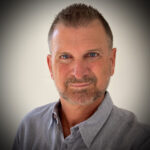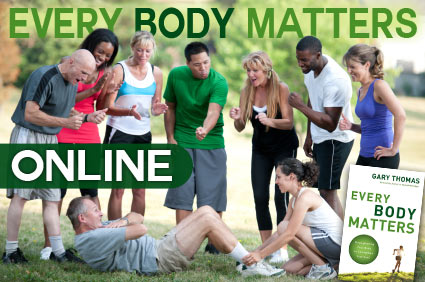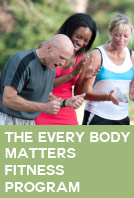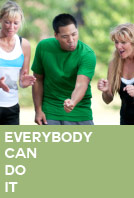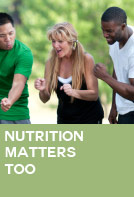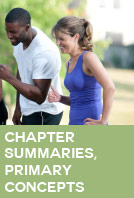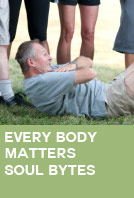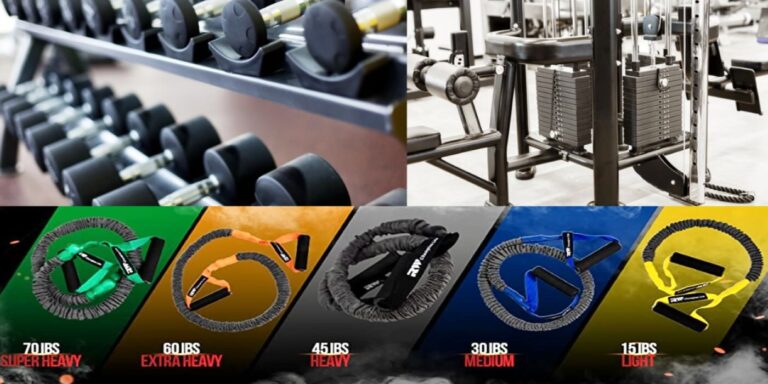The fifteen chapters in the book Every Body Matters provide stories, illustrations and instruction to guide you through important spiritual concepts that can lead to meeting your deeper emotional, relational and faith needs. When this book is used as part of your physical and spiritual training program it can equip you to achieve more comprehensive changes and growth than physical exercise alone.
These chapter summaries and primary concepts are provided as a tool to be used both before and after reading each chapter. They can help you organize your reading and focus on important points. Use the primary concepts to outline your own personal expectations and set the outcomes you want to achieve. Use these chapter summaries and primary concepts to begin a group conversation with the QUESTIONS FOR DISCUSSION AND REFLECTION provided in the book.
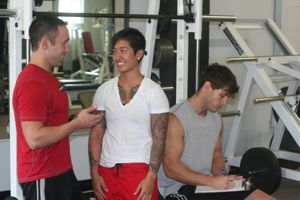 With your activated Faith & Fitness Magazine USERNAME and PASSWORD you and your friends can join others to ADD NEW COMMENT below and contribute to the Every Body Matters ONLINE conversation. In addition to these brief comments that you can share with others you may find that keeping a personal journal with your thoughts, questions, prayers and progress can enhance your Every Body Matters Fitness Program experience.
With your activated Faith & Fitness Magazine USERNAME and PASSWORD you and your friends can join others to ADD NEW COMMENT below and contribute to the Every Body Matters ONLINE conversation. In addition to these brief comments that you can share with others you may find that keeping a personal journal with your thoughts, questions, prayers and progress can enhance your Every Body Matters Fitness Program experience.
The Bible celebrates the silver-making process as a valuable image of personal refinement. Scripture assumes that we aren’t what we need to be—our souls are polluted, less than polished, weighted down by dross—and goes on to describe how God will treat our souls like a silversmith treats raw precious metals. The goal is to be purified and refined for God’s service, just like silver: “In a large house there are articles not only of gold and silver, but also of wood and clay; some are for noble purposes and some for ignoble. If a man cleanses himself from the latter, he will be an instrument for noble purposes, made holy, useful to the Master and prepared to do any good work.” (2 Tim. 2:20-21)
This passage from 2 Timothy becomes the organizing verse for this entire book. How can we become instruments for noble purposes, made holy, and be useful to God, prepared for any good work he might call us to? The whole point of addressing physical fitness is to fulfill that spiritual calling. The reason I want to get in shape, the reason I long for God’s church to get in shape, is not to impress anyone, not to make others feel inferior, not to demonstrate my own personal discipline and self-control. On the contrary, it’s to become, as Paul writes, an instrument of noble purpose, made holy, useful to the Master and prepared to do any good work.
The refining process includes the call to remove our “dross,” the unrefined aspects of our personality that need to be removed in order for us to shine. Gluttony and sloth constitute two aspects of that dross.
According to 1 Corinthians, we don’t own our bodies: “Do you not know that your body is a temple of the Holy Spirit, who is in you, whom you have received from God? You are not your own, you were bought at a price. Therefore honor God with your body.” (1 Cor. 6:19-20) Therefore, how we treat our bodies is a question of stewardship even before it’s a question of health, comfort, enjoyment or pleasure. If we’re truly going to be made holy, useful to the Master, and prepared for any good work, being more energetic and even being healthier can be an essential element of effectiveness.
This chapter ends with the notion that provides the title for the book: the Bible teaches us that every single member of the body of Christ is essential for it to function in its full glory. There is no job in the Kingdom so small that it doesn’t matter. We all need to be prepared, to do our part, which means, every person matters—which also means that every body matters.
 Chapter 1 – PRIMARY CONCEPTS
Chapter 1 – PRIMARY CONCEPTS
– Pursue the process of being spiritually purified.
– Identify your reasons for getting in shape and recognize your noble purpose – to be used of God.
– Recognize gluttony and sloth and determine to not have them in your life.
– Understand the concept of body stewardship and personalize how you will honor God with your body.
– Promote efforts that can lead to everyone being a part of a healthy community based on the notion that every single member is essential.
Featuring the story of Karen Yates, a young mom who faced a common dilemma—what to do with the baby weight from her first two children, and the stress from adopting a third child—this chapter addresses the practical physical benefits and the spiritual impact derived from addressing overeating and sloth. Too many Christians live “from the chin up,” neglecting their physical condition, which has a negative impact on their relationships, energy level, joy in life, and even sexual intimacy. We then seek “spiritual solutions” that don’t take into account practical helps, such as exercise. Karen’s “volleyball therapy” gave her increased self-confidence, improved her relationship with her husband, gave her increased patience with her children, and even had a major impact on her spiritual devotions.
To buttress Karen’s personal experience, this chapter examines the numerous Scriptures in which we are called to be holy “in both body and spirit.”
Chapter 2 – PRIMARY CONCEPTS
– Identify specific ways you can address improper eating habits and laziness.
– Evaluate the way physical fitness impacts you in the areas of relationships, personal energy, mental and emotional strength and sexual intimacy.
– Gain a deeper understanding of holiness and the importance of it in your life. Apply Biblical guidance to pursue being holy.
Addressing our physical shape is one of the ways we take our mission seriously. If we don’t take care of our bodies, we won’t be able to last—at least not with the same energy—to serve God and others as we get older. Satan can use our laziness and gluttony to ultimately bring our ministry to a premature end if we’re not vigilant. Taking care of our bodies is the opposite of selfish—in fact, it’s about preserving our ability to serve.
 Chapter 3 – PRIMARY CONCEPTS
Chapter 3 – PRIMARY CONCEPTS
– Assess your physical history and consider your future physical wellness. (This can be useful information to share with your doctor, personal trainer and other personal wellness professional.)
– Identify what characterizes optimum physical and spiritual energy and list what may prevent you from having that now and in the future.
– Understand how you can promote the stewardship model of body care in your community.
A memoir-like chapter that recounts how God gently challenged me on my poor eating habits and the need to take gluttony more seriously. I show how I began to understand the spiritual issues inherent in my physical discipline and how I had to develop a new relationship with hunger and food to continue to grow in my relationship with God. The difficulty of this struggle produced a “healthy humiliation” that can foster biblical humility; greater compassion and empathy for the sin struggles of others; and an increased ability to withstand other temptations, such as impatience, irritability, and lust.
Chapter 4 – PRIMARY CONCEPTS
– Define hunger and list the key ways you identify when you are hungry.
– Be able to communicate what physical discipline and spiritual discipline mean to you.
– Identify practical ways you can have “healthy humiliation” in your life and be specific in how that will help you to be spiritually stronger.
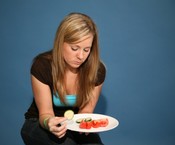
This book does not make a direct connection between being “thin” and being holy. This chapter is designed to provide gentle encouragement, I state that our holiness does not rest on the shape of our bodies, but on the broken, bruised, and acceptable-sacrifice of Jesus’ body. Losing twenty pounds won’t make God love you any more, and gaining twenty pounds won’t make him love you any less.
Even apart from the spiritual aspect, looking at this issue from a medical perspective, body shape isn’t a fair fight. Genetically, certain races are much more likely to have slender bodies. Within races, certain families run thinner than others.
We don’t all face the same struggle. There is no room to judge based on body size alone. The church is to be a healing place of grace, calling all of us from glory to glory, not a hard-edged place of condemnation and judgment. What we can control is where we’re going: if we’ve been less than healthy, as a spiritual exercise, we can commit ourselves to deal with the spiritual issues behind the physical problem.
Chapter 5 – PRIMARY CONCEPTS
– Gain a better understanding of the physical dynamics that can affect body weight, health, function, metabolism and more.
– Examine social attitudes about body image and faith ideologies then define your perspectives on physical appearance and body size and know what the Bible says about God’s relationship with humanity.
– Understand how you currently judge others and outline how you want to improve your relationship with those close to you and your interactions with others.
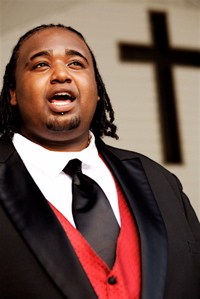
This chapter addresses the question, “Is being overweight a sin?” After all, gluttony is listed as one of the “seven deadly sins,” but does the biblical witness warrant that?
Our conclusion is no. Gluttony is clearly looked on with disfavor by the Old and New Testaments, but the testimony against it is not nearly as direct or as strong as numerous other sins (lust, materialism, theft, etc.). Furthermore, there are reasons other than gluttony or sloth that can lead people to become overweight, and this needs to be respected as well.
However, in the history of Christian spirituality, gluttony is looked down upon as a serious “gateway sin,” a compromise that can lead to spiritual ruin. While being overweight isn’t necessarily the consequence of gluttony, it can be. Wisdom would tell us to pay heed and at least be aware of this spiritual struggle, since the witness against it according to those who have excelled in the Christian life is so strong.
Chapter 6 – PRIMARY CONCEPTS
– Create an understanding of sin based on Bible passages.
– Examine the concept of a “gateway sin” and consider how such a sin can be a strong influence.
– Identify comforts in your life that can hinder you from living a spiritually aware life.
A study published in the New England Journal of Medicine found that obesity is “socially contagious.” Our social environment has a tremendous impact on our own journey of either gaining or losing weight. Florida physician Dr. Scott VanLue sold his practice and opened up a clinic that focuses on wellness. One thing he sees that particularly grieves him is that people gradually grow comfortable with their poor state of health, even when they can do something about it. Scott finds too many people suffering from the effects of obesity who gradually accept their state, take drugs to treat the worst symptoms (high blood pressure, etc.), but do virtually nothing to address the cause.
Because we don’t suddenly gain fifty pounds, we gradually grow used to the decreased mobility, the slow onset of breathlessness, the discomfort of moving around—and we accept it. Just as our social setting gradually conditions us to accept our decreased health, so the gradual descent of our personal health conditions us to individually accept it.
Scott puts it this way: “Deception convinces us that there really aren’t any chains, and that our so-called prison isn’t all that bad a place… Deceived, we start decorating our chains and develop designer syndromes to explain them away… We accept our chains and resign ourselves to confinement in prison cells of disease. We lose hope and…try to make ourselves at home and comfortable in our cell.”
Losing one or two pounds doesn’t feel all that different; gaining three pounds back is hardly noticeable. This phenomenon favors and encourages slow weight gain, even as it discourages steady weight loss. Because the negative impact doesn’t feel that much worse, and the positive impact doesn’t feel all that much better, we’re simply not motivated to get to the place where, long-term, the difference can be tremendous. This explains why the church needs to become a place not just of tolerance, but of inspiration. Unfortunately, it’s acting in the opposite way. Sociologist Kenneth Ferraro has found that religious practice in the United States correlates positively with obesity—and Christians are the heaviest of all.
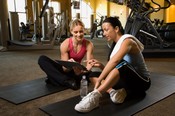 Chapter 7 – PRIMARY CONCEPTS
Chapter 7 – PRIMARY CONCEPTS
– Identify in what areas of your life you have gradually grown accustomed to unhealthy physical and spiritual practices. List some of the factors, practices or attitudes that have led to this gradual shift.
– Define what deception and resignation mean to you.
– Build a strategy to encourage and and support others toward health.
– List ways that your church or faith-nurturing community can inspire healthy living and motivate people to make fitness socially contagious.
Sloth is more than a sin—it’s an attitude that undercuts our sense of duty to God, our obligation to our neighbor, and that wastes our lives. This entire book is focused on becoming “holy, useful to the Master, prepared for every good work.” Sloth is one of the greatest, if not the greatest, enemies of this pursuit. “Good” is never an adjective that a slothful person would put in front of “work.”
Sloth makes many faulty assumptions, covered in this chapter. This chapter also addresses the biblical depiction of sloth as a great enemy. The focus in this chapter, however, is sloth as a spiritual problem (that is, sloth in our spiritual lives, not in our exercise).
Chapter 8 – PRIMARY CONCEPTS
– Identify faulty assumptions from a slothful perspective and apply insights that will cultivate spiritual maturity and good physical habits.
– List the spiritual works you currently do or want to do.
– Understand the difference between upward progression and downward spiral and recognize the factors that lead to each.
– Have a solid definition of neglect and bondage. Then outline ways you can strain, be earnest and intensely exercise your will to pursue health and God.
 Chapter 9 – LET’S GET PHYSICAL
Chapter 9 – LET’S GET PHYSICALThis chapter looks at the physical benefits of gaining victory in these areas, both the positive results of addressing it, and the negative consequences of ignoring it. It contains the inspiring example of how Nelson Mandela emerged from 27 years in jail ready to lead a new South Africa—in large part because he made physical fitness a daily priority during his nearly three decades of incarceration.
Chapter 9 – PRIMARY CONCEPTS
– Be able to describe the positive benefits of exercise and fitness.
– Understand the difference between “getting fit” and “living fit”.
– Identify which consequences of poor physical, spiritual and emotional health are of greatest concern to you and understand why these concern you most.
– Know what it means to be fortified with fitness and create a personal strategy to live that way.
“Muscular Christianity” was a late 19th century movement birthed in England that stressed “manliness” and physical fitness as high Christian ideals. It spread to the United States and had a major impact on the church for a good two generations, spawning such movements as the YMCA (and YWCA) and even the invention of basketball.
This notion of “carrying the gospel to the body” was spawned in part by Englishmen who feared that the Anglican Church was becoming all too accepting of weak, out-of-shape bodies and effeminate men. Muscular Christianity wasn’t about body-building for the sake of looking good, but rather having a body that was fit for active service to God. Weak, effeminate men, and locked-away neurasthenic women, supporters argued, not only live shorter and less effective lives, but they have less energy, command less respect, and provide less of a witness to the world.
To counteract soft, urban living, MC supporters coined the phrase, “the strenuous life.” The thinking was that to live an influential, fruit-filled Christian life required a toughness, a hardy spirit, someone who could confront and face challenges, learn to deal with failure without giving in to it, and rise up to keep moving forward—all lessons that can be learned through sports.
Chapter 10 – PRIMARY CONCEPTS
– Recognize what characterizes a soft or less effective life in general and then specifically in you.
– Know what living a strenuous life means to you and what aspects of a strenuous life you want to implement.
– List ways that you have chased a challenge and consider what challenges you still want to pursue. Be able to explain why you need to pursue these challenges.
Mark Bejsovec, a youth pastor, reached three hundred pounds before he decided that “enough was enough.” This chapter recounts his story, the biblical verses that inspired him, and his decision to begin addressing what he ate (exercise isn’t a significant part of his testimony).
Mark shares how today’s church culture practically enables extreme weight gain by being more concerned about affirmation than challenging someone who may be living an unhealthy lifestyle. This chapter ends by describing some creative ways that churches are mixing spiritual and physical fitness.
 Chapter 11 – PRIMARY CONCEPTS
Chapter 11 – PRIMARY CONCEPTS
– Document and analyze what you eat and general patterns in your daily/weekly diet.
– Assess the food and eating culture in your church along with attitudes toward fitness and wellness. Consider conversations you can have and efforts that you can initiate.
– Select and prepare one or more tasty and healthy recipes that you can introduce to a future church or community gathering.
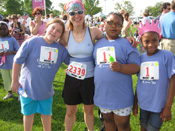 Chapter 12 – STRONGER SHOULDERS
Chapter 12 – STRONGER SHOULDERS“Stronger shoulders” features the life story of Kristin Armstrong, the ex-wife of the famous bicyclist Lance Armstrong. By the time Kristin met Lance, she had “kind of floated” in her faith, but the dissolution of her marriage took her to the end of her independence. Already slim, she began losing even more weight. She had difficulty handling her emotions. She showed all the signs of stress you’d expect to find in a suddenly single mom going through a high-profile divorce.
In an effort to help their friend, two women challenged Kristin to run a marathon with them. Kristin had run only casually, and couldn’t imagine taking on a marathon, but one of her friends said, “Kristin, you have three children to take care of. You can’t afford to fall apart. You need some help. You need to get in shape.”
In Kristin’s words, “They knew that I needed to gain the confidence of knowing I could work through pain on a physical level so that I could face the work ahead of me on emotional and spiritual levels.”
Kristin’s friends had tapped into the truth we’ve explored here: getting physically fit can help us face spiritual and relational challenges. It won’t make those challenges go away, but it can give us stronger shoulders to face them. The healing effects of Kristin’s new training regimen soon became readily apparent. The training prepared her for some “brutal” mediation sessions. She started sleeping better, and replaced the weight loss with a bit of muscle gain. But the real story was Kristin’s spiritual resurgence.
“Becoming fit means that, if you lose your job, your spouse walks out, or you discover you have a lump in your breast, you’re strong and you have the endurance you need because life is going to get really tough. You need to be strong and you need to have endurance. Getting fit is not about what I look like in a pair of jeans; instead, I really care about being strong and having endurance spiritually.”
Kristin believes that a Christian who has learned how to endure is a Christian who isn’t as vulnerable to everyday challenges. The enduring life is a solid life built over time—and physical training can feed into it. “As we run we train our bodies, minds, and spirits, and our fitness levels in each category rise accordingly.”
Chapter 12 – PRIMARY CONCEPTS
– Be able to work through emotional and spiritual pain by using physical challenges.
– Define the everyday challenges you face and highlight ways you can have endurance.
– Explain the “running to something” attitude of faith-based fitness.
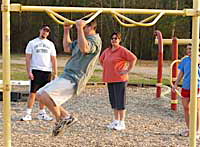 Chapter 13 – PURELY PRACTICAL
Chapter 13 – PURELY PRACTICALNow that we’ve laid out the spiritual principles behind a life of physical fitness, becoming “tougher” internally, rejecting gluttony and sloth, this chapter addresses some basic “how to” issues: what is fitness? How do we get started in that direction, and maintain our efforts? What are the benefits of a group effort? How much is enough? What are the advantages of a “gentle” approach? These points are addressed with advice offered by recognized leaders, studies and experts in their field.
Chapter 13 – PRIMARY CONCEPTS
– Identify areas where you need a gentle approach to physical fitness.
– List several ways you can exercise in a group then rate them so you can progress from something you find easy to do with others to something that will push you out of your comfort zone.
– Map a long-term strategy so you can maintain your efforts in physical fitness and spiritual growth.
– Identify the challenges that may cause you to quit then identify ways you can overcome those challenges.
This chapter begins with a personal story about pursuing a dream, which then sets up Paul’s words to Timothy, “But you, man of God, flee from all this, and pursue righteousness, godliness, faith, love, endurance and gentleness.”
Does today’s church earnestly pursue righteousness, godliness, faith, love, gentleness, and endurance with the passion the Bible calls us to? Many Christians today tend to be somewhat passive about their shortcomings, assuming that time alone, and saying “sorry,” will make it better—but transformative growth never happens under such passivity.
The Bible and the ancients tout a much different approach: something called “mortification.” (My friend “Morty”). This chapter is a popular, cookies-on-the-low-shelf depiction of practical mortification—how we can address our sin and even learn from our sin so that it has less influence on our lives.
I end the chapter by connecting some of our earlier thoughts about physical fitness to this battle against spiritual sloth. We grow into holiness like we grow into fitness.
Chapter 14 – PRIMARY CONCEPTS
– Define passion and be able to identify how physical fitness and spiritual training will bring transformative growth in your life.
– Describe how you learn from sin.
– Understand the difference between being good and being Christlike and explain what is needed for you to pursue something greater than good.
– Understand the acts of mortification.
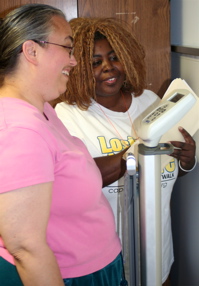 Chapter 15 – THE LAST CHRISTIAN
Chapter 15 – THE LAST CHRISTIANWith all the challenges facing the contemporary church, we need, as much as anything, to raise tough believers. All this talk about fitness, facing the pain of getting in shape, actively combating gluttony and sloth, is, in many ways, an appeal for the church to get tougher. We are soft. We cave in at the slightest challenge. Men are lost to superficial sins; women are lost to superficial cares, and the work of the Kingdom remains undone. If we don’t get tougher, the work will never get done.
What if, as he has throughout history, God allows the faithful to be universally persecuted, to the point that we become isolated, hunted, and scattered? What if, as already exists in many countries, a person had to choose between remaining true to God and being gainfully employed, or even married? Would we still be standing, would we still sign up, if we thought we were the last Christian?
From a biblical perspective, this chapter features the story of the Old Testament prophet Jeremiah, an amazingly resilient man who was ostracized by everyone he knew, yet who remained faithful to the end. I also showcase Paul, who displayed the same remarkable endurance and fortitude. It is the church’s duty and calling to raise men and women with the strength of Jeremiah and Paul, who will not wilt in the face of the fiercest persecution imaginable.
Becoming spiritually and physically fit are two ways that we can grow in our inner and outer strength, as well as the ability and willingness to endure hardship. The end result is that we, like Jeremiah and Paul, might become truly useful to the master, prepared for any good work.
 Chapter 15 – PRIMARY CONCEPTS
Chapter 15 – PRIMARY CONCEPTS
– Describe how you can avoid caving into challenges and how you can pursue toughness.
– Consider how you measure your identity and how your spiritual needs are shaped by your personal faith.
– Identify ways that you want to be better spiritually prepared and consider how your church, gym, friends and family can help you do that.
– Define being faithful and being filled with discouragement. List how being faithful will strengthen you and make a positive impact in the lives of others.
